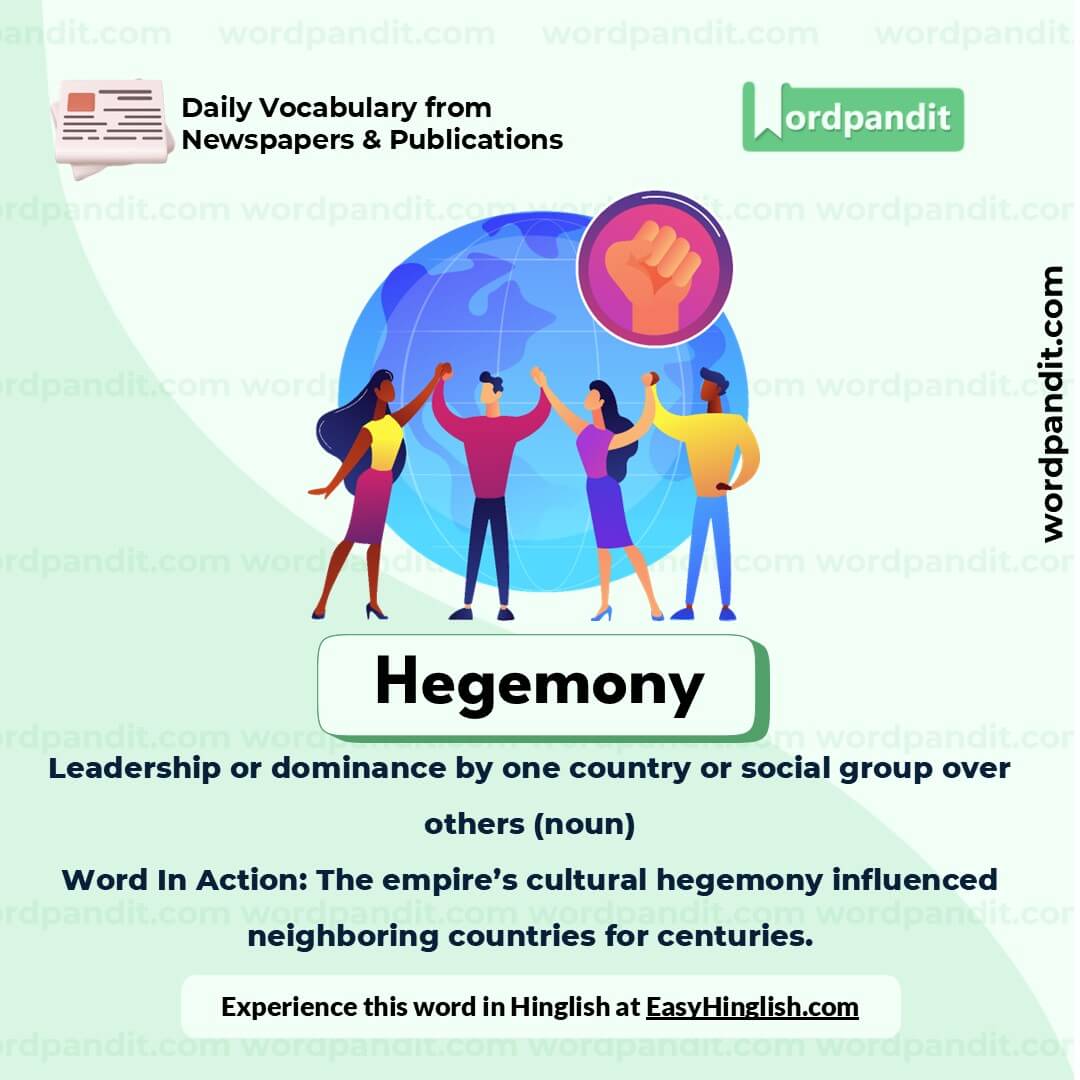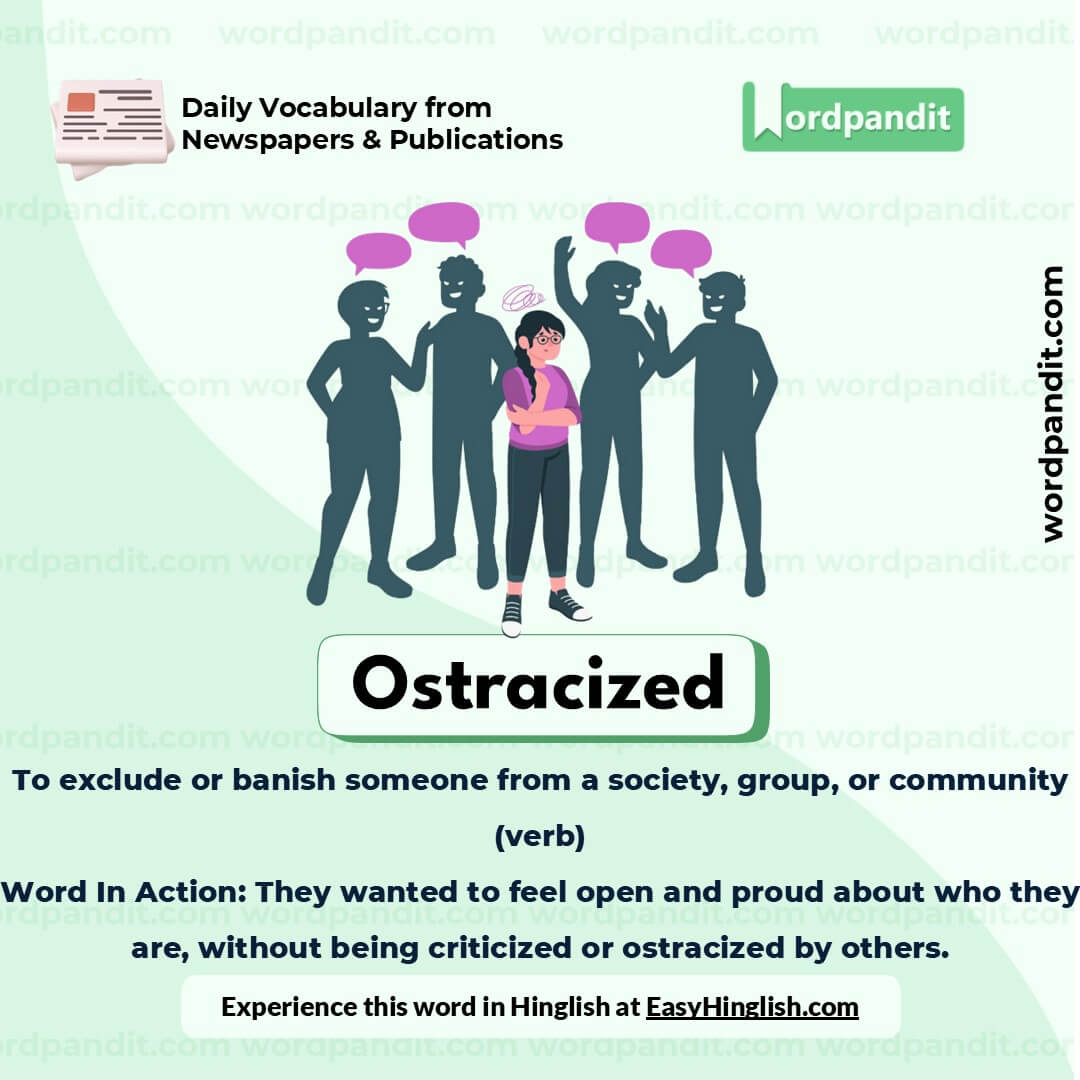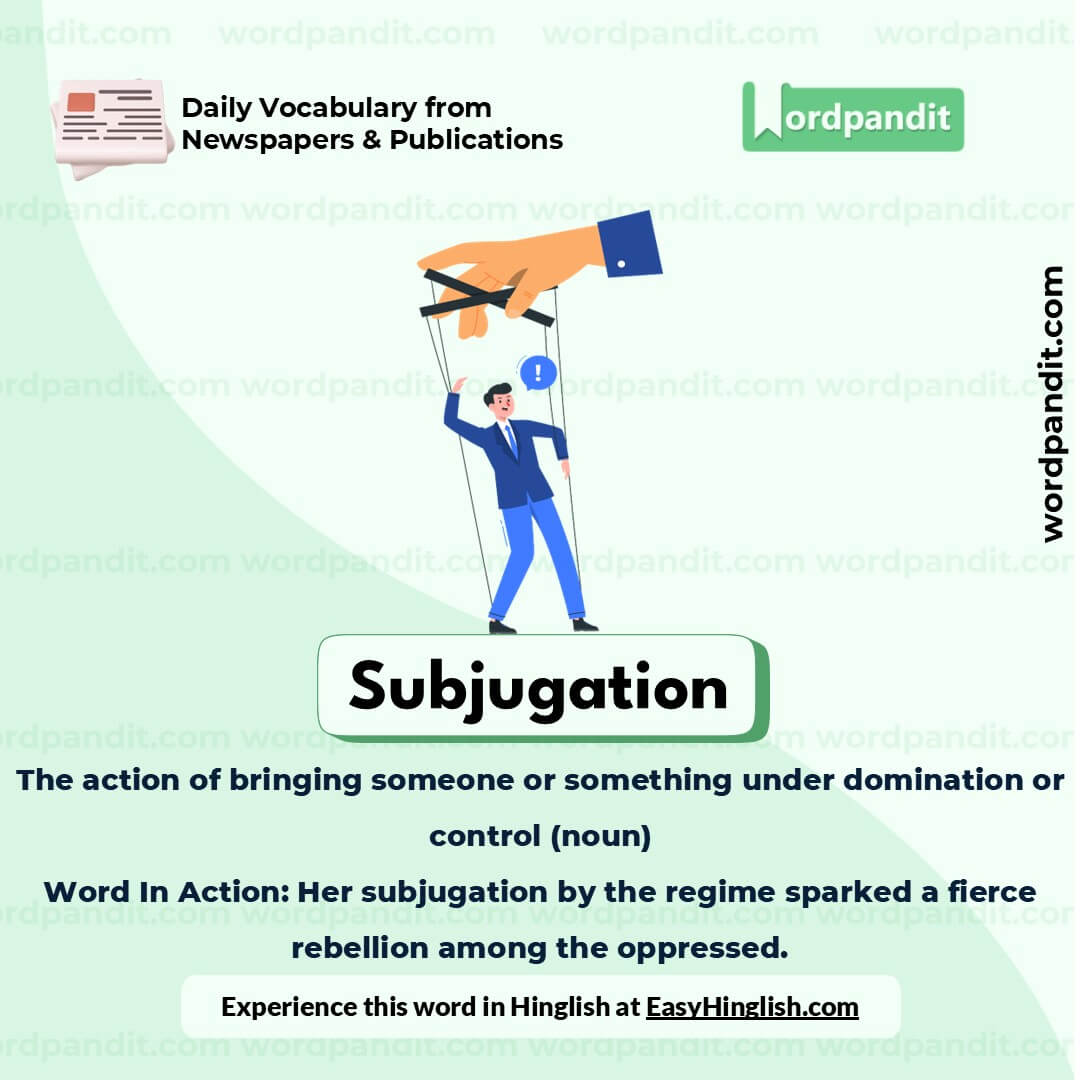Daily Vocabulary from International Newspapers and Publications
Expand Your Vocabulary with Wordpandit’s Global Vocabulary Hub
At Wordpandit, we are committed to helping you develop a truly global vocabulary by drawing from some of the most respected international publications. This section is designed to keep you ahead of the curve by introducing you to words that define global conversations and trends.
The Power of Global Sources
To help you think and communicate on a global scale, we curate vocabulary from renowned international sources, such as:
- The New York Times
- The Washington Post
- BBC
- The Guardian
- The Economist
- Scientific American
- Psychology Today
- And many more...
Stay Global, Stay Competitive
Our daily updates from international publications ensure you are consistently exposed to new words that reflect global news and developments, making sure your vocabulary is not only current but also globally relevant.
Enhance Your Global Perspective
Whether you’re preparing for international exams, aiming to excel in global business communication, or want to enhance your language skills for personal growth, Wordpandit offers the resources you need to thrive in a global context.
Effective Learning, Global Reach
Our learning methodology combines global examples, memory aids, and interactive activities, allowing you to internalize new words effectively and apply them in real-world scenarios.
Begin Your Global Vocabulary Journey Now!
Why Choose Wordpandit?
Practical Learning: Focus on words you'll actually encounter in real-world reading, enhancing your comprehension and communication skills.
Diverse Content: From current affairs to scientific breakthroughs, our varied sources expose you to vocabulary across multiple domains.
Effortless Integration: Make Wordpandit a part of your daily routine. Just a few minutes each day can significantly boost your lexicon over time.
Your Path to Vocabulary Mastery
- Visit our Daily Vocabulary section regularly
- Explore new words and their usage in context
- Practice incorporating these words into your own writing and speech
- Track your progress as your vocabulary expands
Start Your Journey Today
Embark on your vocabulary enhancement journey with Wordpandit. By consistently engaging with our daily posts, you'll build a robust vocabulary that serves you well in academic, professional, and personal contexts.
Remember, a word a day keeps linguistic limitations at bay. Make Wordpandit your daily companion in the quest for vocabulary excellence!
WORD-1: Cathartic
Context:
"It’s nice to ground myself in the parts of the day that were enjoyable and positive! If a day is particularly horrendous, saying, 'I’m grateful this day is over' is acceptable and cathartic." - Scientific American
Explanatory Paragraph:
The word cathartic describes an experience or action that provides emotional relief and cleansing, often through the release of pent-up emotions. It’s commonly used when discussing activities that help people process difficult feelings, making them feel lighter or more at peace afterward.
Meaning: Providing psychological relief through the open expression of strong emotions (adjective)
Pronunciation: kuh-THAR-tik
Difficulty Level: ⭐⭐⭐ (Intermediate)
Etymology: From Greek kathartikos, meaning "fit for cleansing"
Synonyms & Antonyms:
Synonyms: relieving, purifying, cleansing, liberating, therapeutic
Antonyms: stressful, disturbing, traumatic, unsettling, aggravating
Usage Examples:
- Writing in her journal each night felt cathartic, helping her release the stress of the day.
- He found the long hike through the mountains to be a cathartic escape from his busy life.
- Talking to a friend about her problems provided a cathartic release that she desperately needed.
- Watching a deeply moving movie can often be a cathartic experience, bringing suppressed emotions to the surface.
Cultural Reference:
In Aristotle's writings on drama, he describes a play’s emotional release, or catharsis, as the purpose of tragedy, where audiences purge emotions of pity and fear through the play’s climax.
Think About It:
What are some activities or practices that provide you with a cathartic release? Why do you think they are effective for you?
Quick Activity:
List three experiences or actions that feel cathartic for you. Try to describe how you feel before and after each one.
Memory Tip:
Think of "cathartic" as related to "catharsis"—both involve the release and cleansing of emotions.
Real-World Application:
The concept of "cathartic" is useful in therapy and wellness discussions, as it identifies experiences that help people process and alleviate emotional burdens.
WORD-2: Stampede
Context:
"Most people are just in denial about the risks. At some point, there’s going to be a stampede." - The Washington Post
Explanatory Paragraph:
The word stampede refers to a sudden, often panicked rush of people or animals, usually triggered by fear, urgency, or excitement. This term is commonly used to describe chaotic situations where large groups move in an uncontrollable way, often leading to potentially dangerous consequences.
Meaning: A sudden, frenzied rush of people or animals, usually driven by panic or excitement (noun); to move in a sudden, chaotic rush (verb)
Pronunciation: stam-PEED
Difficulty Level: ⭐⭐ (Easy)
Etymology: Originated from American Spanish estampida, meaning "a crash, uproar," derived from Spanish estampar meaning "to stamp"
Synonyms & Antonyms:
Synonyms: rush, surge, dash, scramble, charge
Antonyms: order, retreat, calm, organization, halt
Usage Examples:
- As soon as the doors opened on Black Friday, there was a stampede of shoppers racing to grab deals.
- A loud noise startled the cattle, causing them to stampede across the field.
- During the fire drill, the students were careful not to create a stampede as they exited the building.
- The fans began to stampede toward the stage when the concert began.
Cultural Reference:
The 1994 Disney film The Lion King famously features a dramatic wildebeest stampede, which is pivotal in the story and emphasizes the chaos and unpredictability of nature.
Think About It:
What are some situations where you might see a stampede, and what precautions could help prevent it?
Quick Activity:
Imagine you’re at a crowded event, and a stampede begins. Write a brief plan describing how you would stay safe and help others if possible.
Memory Tip:
Picture the word "stampede" as a sudden "stamp" of feet rushing away in panic, helping to remember its meaning of a chaotic, rapid movement.
Real-World Application:
"Stampede" is frequently used to describe high-stakes situations where crowds rush in a dangerous manner, such as sales events, evacuations, or natural disasters, highlighting the importance of safety measures in large gatherings.
WORD-3: Hegemony
Context:
"He also took issue with Western sanctions on Russia and North Korea, saying that they both 'do not tolerate the language of blackmail and diktat' and would continue to counter the West's use of 'sanctions strangling' to maintain 'hegemony'." - BBC
Explanatory Paragraph:
Hegemony refers to dominance or leadership that one state or group exerts over others, often using power or influence to control social, economic, or political aspects. This word typically describes the way a more powerful country or organization might impose its will on less powerful ones, often subtly through economic or cultural means rather than open force.
Meaning: Leadership or dominance, especially by one country or social group over others (noun)
Pronunciation: hih-JEM-uh-nee
Difficulty Level: ⭐⭐⭐⭐ (Advanced)
Etymology: From Greek hegemonia meaning "leadership" or "authority"
Synonyms & Antonyms:
Synonyms: dominance, supremacy, control, authority, power
Antonyms: subordination, equality, weakness, submission
Usage Examples:
- The nation maintained its hegemony in the region through economic influence and military presence.
- Cultural hegemony can shape public opinion by establishing certain values as the norm.
- Many countries have pushed back against what they perceive as American hegemony in global affairs.
- Through hegemony, the powerful state influences weaker countries' political decisions.
Cultural Reference:
"In cultural hegemony, the values of the ruling class become the 'common sense' values of all." - Antonio Gramsci
Think About It:
In what ways can cultural hegemony influence personal beliefs and values without people being aware of it?
Quick Activity:
List two examples of hegemony you see in today’s world—one in politics and one in culture. Describe how each entity maintains its influence.
Memory Tip:
Think of "hegemony" as "head money"—a "head" (or leader) having the power to control and influence others.
Real-World Application:
Understanding "hegemony" is essential for analyzing global politics, as it helps explain why certain nations or groups hold significant influence over others.
WORD-4: Ostracized
Context:
"There were many differences between those two groups, but what united them was a desire to feel as if they could be themselves in America, open and proud about who they are, without being criticized or ostracized by other people." - The New York Times
Explanatory Paragraph:
The word ostracized means to exclude someone from a group or community, often by ignoring or rejecting them. When people are ostracized, they are made to feel unwelcome or unaccepted, usually because of their beliefs, appearance, or behavior. This exclusion can have profound effects on an individual's sense of belonging and self-worth.
Meaning: To exclude or banish someone from a society, group, or community (verb)
Pronunciation: OS-truh-sized
Difficulty Level: ⭐⭐⭐ (Intermediate)
Etymology: From Greek ostrakizein, meaning "to banish by voting with pottery shards (ostraka)" in ancient Greece
Synonyms & Antonyms:
Synonyms: exclude, shun, alienate, reject, banish
Antonyms: include, welcome, accept, embrace, integrate
Usage Examples:
- After voicing her opinions, she felt ostracized by her classmates.
- He was ostracized from the group for not following the established norms.
- The new policies led to the ostracization of certain marginalized groups.
- Many people fear being ostracized if they express unconventional ideas.
Cultural Reference:
"In ancient Athens, citizens could be ostracized if they were deemed a threat to the state, effectively banished by a vote." - History of Greek Democracy
Think About It:
What are some ways that societies or communities can prevent the ostracism of individuals with differing viewpoints?
Quick Activity:
Write about a time when you or someone you know was excluded from a group. What were the reasons, and how did it feel?
Memory Tip:
Think of "ostracized" as "ostracism" + "sized," visualizing how someone can be "sized out" or excluded from a group.
Real-World Application:
Recognizing the effects of ostracism is important in workplaces, schools, and communities to build inclusive environments where everyone feels valued.
WORD-5: Subjugation
Context:
"He is strongly critical of what he sees as the official “instrumentalisation” of the 1954-1962 war of independence against France; and of what he sees as the continuing subjugation of women in Algerian society." - BBC
Explanatory Paragraph:
Subjugation refers to the act of bringing someone or something under control, often by force. It suggests a condition where individuals or groups are dominated and deprived of freedom or agency, usually by those in power. This term is often used in contexts related to societal oppression or military conquest.
Meaning: The action of bringing someone or something under domination or control (noun)
Pronunciation: suhb-juh-GEY-shuhn
Difficulty Level: ⭐⭐⭐⭐ (Advanced)
Etymology: From the Latin subjugare, meaning "to bring under the yoke"
Synonyms & Antonyms:
Synonyms: domination, oppression, control, conquest, enslavement
Antonyms: liberation, freedom, independence, emancipation, autonomy
Usage Examples:
- The subjugation of native populations by colonizers is a dark chapter in history.
- He resisted any form of subjugation, believing firmly in personal freedom.
- Activists protested the political subjugation imposed on the region.
- The novel explores themes of power and subjugation in a dystopian society.
Cultural Reference:
"Justice and judgment lie often a world apart." - Emmeline Pankhurst, highlighting how systems of power can create conditions of subjugation rather than justice.
Think About It:
How does subjugation impact a society's growth and the well-being of its people?
Quick Activity:
List five examples from history where subjugation played a major role in shaping events. Reflect on the impact on the affected people or groups.
Memory Tip:
Think of "subjugation" as "subjecting" someone to control to remember its connection to dominance and lack of freedom.
Real-World Application:
The word "subjugation" is commonly used in discussions about human rights, historical events, and political or social movements to describe systemic oppression and control.


















